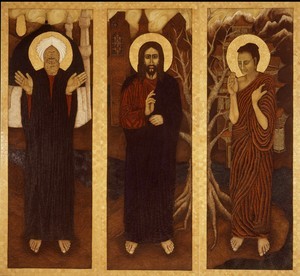
10:34 “Do not think that I have come to bring peace to the earth. I have not come to bring peace but a sword. 10:35 For I have come to set a man against his father, a daughter against her mother, and a daughter-in-law against her mother-in-law, 10:36 and a man’s enemies will be the members of his household.”
-Jesus Christ, Matthew 10:34-36
People have been writing various Holy Books for as long as there has been writing. Pending how you choose to interpret certain cave paintings, people have been recording experiences with the Sacred from *before * there was writing!
Some of the earliest known, if not absolute oldest writings every found are the Sumerian Epics of Creation, the Enuma Elish which outlines the creation of the Universe and how Man came to exist. We will look at the Enuma Elish a bit closer later on.
Needless to say, quite a bit of emphasis is placed on who’s Holy Book is ‘most accurate’, and the unadulterated word of God, so let us clarify the issue right off.
No one’s Holy Book is the unadulterated word of God.
This bold statement can be readily supported by two facts: one, unless it was written by God’s own hand, it was filtered through human beings on the way to the page, and filtered again when it was compressed into language. In the case of the Christian New Testament or the Qu’ran, these books were not written by Jesus or Muhammad (PBUH), but by followers who recorded their words to the best of their abilities. In the case of the New Testament, it was recorded by the followers of followers, usually decades after the events actually took place.
The second point, is if God had absolutely said what He mean at one time in one place, that would be the only Holy Book and that would be the only religion. The fact that an (assumed) all-knowing, all-powerful Deity allows multiple paths to exist, would seem to imply there is some value in multiple paths. How to know what the Deity is like has been explored here, and the logical flaws with believing any one Faith has all the answers has been addressed here.
What is Scripture?
First, what Scripture is *not *. Scripture is not PROOF of anything.
The argument that the Bible / Qu’ran / Torah / Bhagavad Gita says -blank- only works if the person chooses to accept the book as an authority!
Since whatever argument you are making can probably be refuted from inside your own Holy Book, much less from someone else’s.
Remember, believing something passionately is not the same as absolute empirical proof.
So what, then, is the value of Scripture?
Quite frankly, the value of Scripture is to gain an insight into the minds of people who ideally witnessed fantastic events, or at least had dedicated their lives to the service of their Creator. They provide a brilliant insight into history, mythology, and life lessons that still apply to every facet of our modern lives.
If you choose to believe that one Holy Book is vastly superior than all the others, I would pose two question: one, have you ever read any of the other ones? They may have more to offer than you think! Two, if you are unwilling to read any of the others, then take the time to educate yourself on the history of your Holy Book. Where it came from, who wrote it and when, who edited it and why, and who translated it. Just learning about what happened at the Council of Nicea should be fascinating study for any Christian, Muslim, or other related Faiths.
What, then, is the best way to interpret Scripture?
First and foremost, realize that your interpretation is just that: your interpretation. And here is a secret: your Rabbi, Imam, Preacher, anyone else only has their own interpretations as well. God is more than capable of revealing to you what God wants you to know.
A good way to answer questions and solve problems is to sit down with your chosen Holy Book and just open it at random and let your eyes fall onto the page and read it. Quite often the answer you are seeking will be revealed to you!
And above all else: wrestle with it.
If you haven’t read you Holy Book from cover to cover, make a plan and do it. If you are REALLY serious, learn it’s original language and read it there, since the process of translation always takes something out of a work, as any person who speaks multiple languages can tell you.
And when you are trying to understand things, they often make sense out of context.
For instance, at the beginning of this article is a quote from Jesus saying that he came to bring discord, not peace. Look at it in the context of the verse that come before and afterwards (this and all verses taken from www.netbible.com):
Fear God, Not Man
10:26 “Do not be afraid of them, for nothing is hidden that will not be revealed, and nothing is secret that will not be made known.
10:27 What I say to you in the dark, tell in the light, and what is whispered in your ear, proclaim from the housetops.
10:28 Do not be afraid of those who kill the body but cannot kill the soul. Instead, fear the one who is able to destroy both soul and body in hell.
10:29 Aren’t two sparrows sold for a penny? Yet not one of them falls to the ground apart from your Father’s will.
10:30 Even all the hairs on your head are numbered.
10:31 So do not be afraid; you are more valuable than many sparrows.
10:32 “Whoever, then, acknowledges me before people, I will acknowledge before my Father in heaven.
10:33 But whoever denies me before people, I will deny him also before my Father in heaven.
Not Peace, but a Sword
10:34 “Do not think that I have come to bring peace to the earth. I have not come to bring peace but a sword.
10:35 For I have come to set a man against his father, a daughter against her mother, and a daughter-in-law against her mother-in-law,
10:36 and a man’s enemies will be the members of his household.
10:37 “Whoever loves father or mother more than me is not worthy of me, and whoever loves son or daughter more than me is not worthy of me.
10:38 And whoever does not take up his cross and follow me is not worthy of me.
10:39 Whoever finds his life will lose it, and whoever loses his life because of me will find it.
Rewards
10:40 “Whoever receives you receives me, and whoever receives me receives the one who sent me.
10:41 Whoever receives a prophet in the name of a prophet will receive a prophet’s reward. Whoever receives a righteous person in the name of a righteous person will receive a righteous person’s reward.
10:42 And whoever gives only a cup of cold water to one of these little ones in the name of a disciple, I tell you the truth, he will never lose his reward.”
Jesus is talking to the Disciples about the need to live and apply his teachings, and not to be afraid of other people’s judgments or criticisms, and to be fearless even in the face of death.
While this is clearly a Christian slanted message, it applies to any Spiritual person across all areas of life: stand up straight! Know your passions and convictions and live them, since you are utterly invincible. And if the time comes that you should fall, you can either fall knowing you did your best or reaping your rewards in the next life.
And so what out of context seems like a few verses advocating arguing with your parent, in context is showing the need to be committed to your ideals and convictions no matter what life throws at you.
Understand?
*NOTE: the beautiful image that accompanies this blog post can be found and ordered at http://www.vargagallery.com/VARGATriptych.htm Artist: Christina Varga – VARGA Gallery – WOODSTOCK, NY.*
What do you think? Feel free to comment down below!
You are great, and I love you!
And if you love me back, click subscribe over on the right hand side!
B. Dave Walters
Writer, Life Coach, and Talk Radio Host
Find out more about me:
http://about.me/BDaveWalters
Ask me anything:
http://formspring.me/BDaveWalters
Pages I support:
Jesus and Buddha — Interfaith dialog
Gnostic Theism — Religion and Spirituality for the 21st Century (Join the Movement!)
Love One Another — A safe place to come find more reasons to smile!

